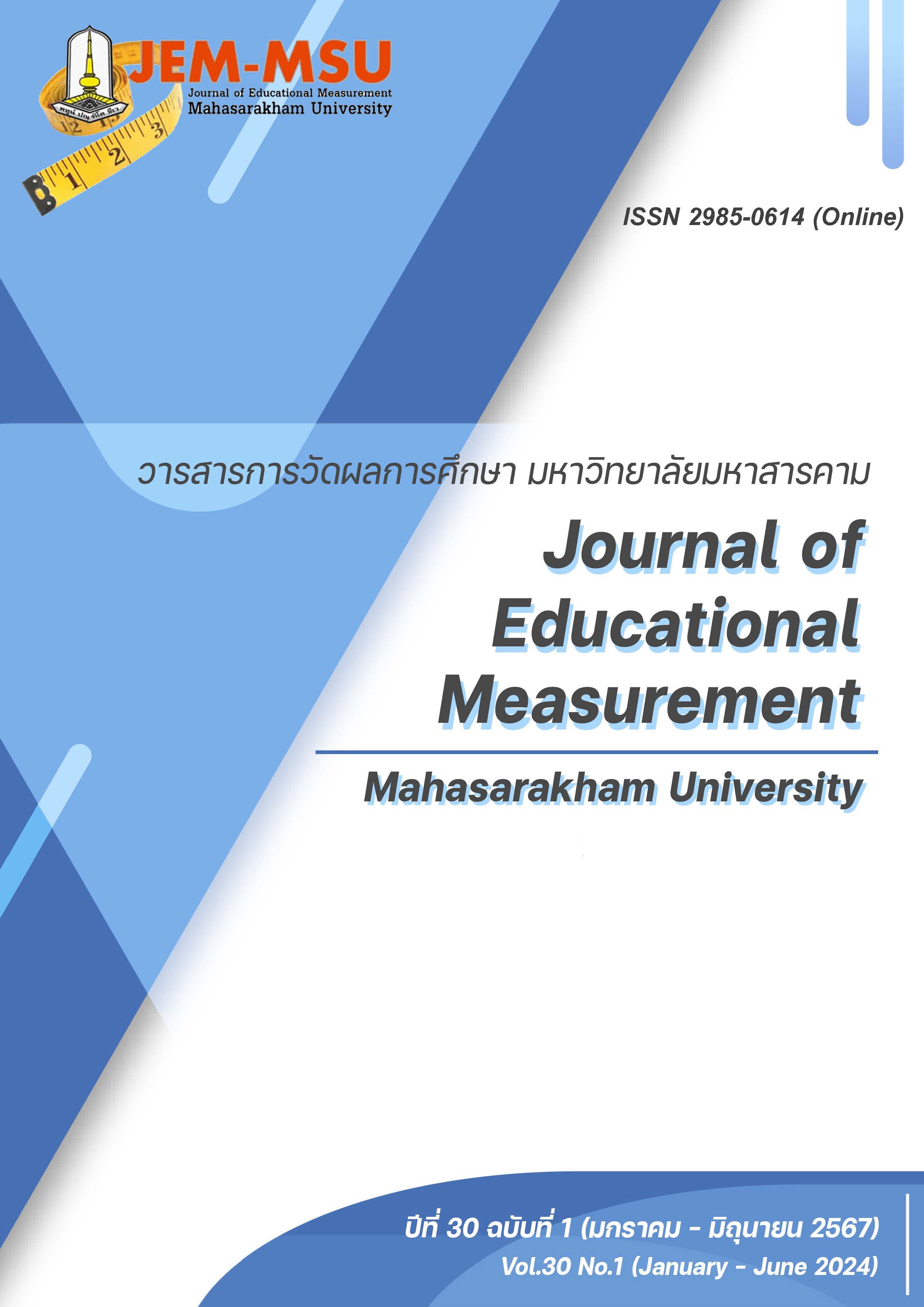The Development of Learning Management to Promote Reading Literacy and Learning Achievement Using PISA Competency-based Approach for Grade 9 Students
Main Article Content
Abstract
The objectives of this research were to 1) assess the effectiveness of organizing learning activities, 2) assess reading literacy, and 3) study the achievement of grade 9 students, based on the PISA competency-based approach. The sample was 41 grade 9 students, from 1 group, of Mahasarakham University Demonstration School (Secondary) in the second semester of the academic year 2022, obtained by cluster random sampling, using the student group (7 groups of students having the same characteristics) as the sampling unit. The research tools were 1) a learning plan, 2) a reading skill exercise sheet, 3) a reading literacy assessment form following PISA competency-based, and 4) a learning achievement test. The analysis of data employed percentage, standard deviation, and t-tests for hypothesis testing.
The research findings were as follows:
1. The efficiency (E1/E2) of the learning management model based on the PISA competency-based approach for grade 9 students was 84.88/85.27, higher than the preset criterion (80/80).
2. The reading literacy of the grade 9 students taught by the PISA competency-based approach, following the PISA 2018 evaluation framework, was composed of 5 components: 1) accessing and retrieving information, 2) integration and inferences, 3) evaluating and reflecting, 4) using reading information, and 5) reading engagement. On the whole, most of the students had their reading literacy at level 3 (moderate), accounting for 73.17 percent, followed by level 4 (difficult and complicated level), accounting for 26.83 percent, and there were no students in level 1 (lower than the basic level), level 2 (basic level) and level 5 (high level).
3. The students had higher learning achievement after learning (an average score of 21.32), which was higher than before learning (an average score of 14.22), using a t-test for dependent samples (t = 21.03, P <0.0001) at the significant level of .05.
Article Details

This work is licensed under a Creative Commons Attribution-NonCommercial-NoDerivatives 4.0 International License.
The content and information contained in the published article in the Journal of Educational Measurement Mahasarakham University represent the opinions and responsibilities of the authors directly. The editorial board of the journal is not necessarily in agreement with or responsible for any of the content.
The articles, data, content, images, etc. that have been published in the Journal of Educational Measurement Mahasarakham University are copyrighted by the journal. If any individual or organization wishes to reproduce or perform any actions involving the entirety or any part of the content, they must obtain written permission from the Journal of Educational Measurement Mahasarakham University.
References
OECD. (2018). Thailand - Country Note - PISA 2018 Results. PISA.
Buasri, T. (1999). Course theory, design and development (2nd ed.). Education Development. (in Thai)
Chaina, P. (2020). The Development of active reading ability and student based on content language [Master's thesis]. Srinakharinwirot University. (in Thai)
Chandai, S. (2016). Teaching style along the teaching guidelines, supplementary reading experiences per self-directed learning to promote reading learning of junior high school students [Doctoral dissertation]. Chulalongkorn University. (in Thai)
Institute for the Promotion of Teaching Science and Technology. (2009). PISA International Student Assessment Framework 2009. Printing House of Agricultural Cooperatives of Thailand Co., Ltd. (in Thai)
Jamkrajang, P. (2021). The Development of Proactive Reading Learning Management Model in Promoting Lower Secondary School Students’ Reading Literacy and Learning Achievement [Doctoral dissertation]. Valaya Alongkorn Rajabhat University. (in Thai)
Jamkrajang, P., Aranwong, R., & Onyon, N. (2020). Confirmatory Factor Analysis on The Reading Literacy of Secondary School Students. Valaya Alongkorn Review (Humanities and Social Science), 10(3), 126-139. (in Thai)
Khemmanee, T. (2008). Teaching style. Chulalongkorn University Press. (in Thai)
Ministry of Education. (2018). Basic Education Core Curriculum 2008 (Revised Edition 2017). Agricultural Cooperative Assembly of Thailand. (in Thai)
National Institute of Educational Testing (Public Organization). (2020). Summary of educational test results Basic national level (O-NET), Mathayomsuksa 3, academic year 2019. https://www.niets.or.th/th/catalog/view/3121 (in Thai)
Office of the Royal Institute. (2019). Dictionary of Contemporary Education (Literacy). Arun Typing. (in Thai)
Satthaphong, T., & Eakwannang, A. (2020). A Development of Reading Literacy Ability in Accordance with The PISA Test Using by Reading Apprenticeship Approach of Lower Secondary School Students. Journal of Education, 43(1), 85-96. (in Thai)
Secretariat of the Education Council. (2019). Basic Education Level Learner Core Competencies Framework. Printing house 21 Century Company. (in Thai)
Wongchai, S. (2020). Learning Management Strategies for Enhancing Reading Literacy. .Journal of Graduate School, 17(79), 1-10. (in Thai)
Yahakorn, S. (2011). Measurement and evaluation of Thai language grades at primary school. In the material processing Course set Organizing Thai language learning experience (Unit 15). Sukhothai Thammathirat Open University. (in Thai)


